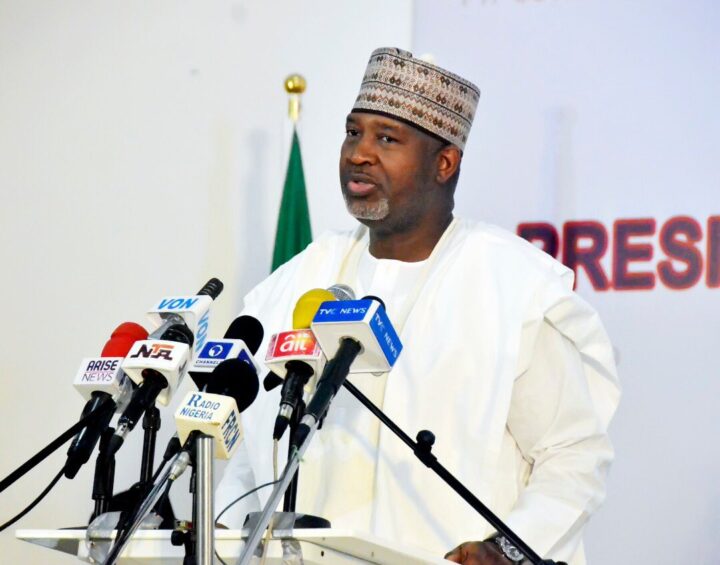Last Monday, Miyetti Allah Kautal Hore said the law recently enacted by some states would worsen cattle rustling and undermine stability across the country.
Saleh Alhassan, national secretary of the association, said the anti-open grazing law will destroy livestock production and send millions of people that depend on the livestock value chain into poverty.
The association then called on the national assembly to intervene and stop the attempts by state governors to prohibit open grazing.
To curb clashes between farmers and herders across the country, some state governors have enacted laws banning open cattle grazing.
Advertisement
Notably is the resolution made by governors of the 17 southern states, after a meeting in Asaba, Delta state capital, to ban open grazing and the movement of cattle by foot. The governors had said the decision was taken as part of efforts to improve security in the region.
September 1 was set as the deadline for the states to enact the law, but while the law is already operational in several states, some states are still in the process of passing the bill.
The proposed plan to ban open grazing in the south has been greeted with mixed reactions, with a number of stakeholders opposing the move.
Advertisement
In reaction, the presidency said the proposed plan was of “questionable legality” and that it will not solve the farmer-herder clashes.
Abubakar Malami, attorney-general of the federation (AGF), also faulted the decision of the southern governors and likened the resolution to prohibiting spare-part trading in the north.
The Northern Elders’ Forum (NEF), on its part, said the proposed plan was an attempt to split the north and subject its people to humiliation and attacks.
WHAT HAS THE FEDERAL GOVERNMENT DONE?
Advertisement
The federal government introduced the National Livestock Transformation Plan (NLTP) to address the crisis between herders and farmers in the country.
In September 2019, NEC had proposed a budget of N100 billion for the implementation of the NLTP, with the federal government providing 80 percent of the fund, and the remaining being the responsibility of the states. Subsequently, the plan was launched in Adamawa state by Vice-President Yemi Osinbajo.
Giving an update on the plan in June, Sabo Nanono, the then minister of agriculture and rural development, had said 22 states and the federal capital territory (FCT) registered for the NLTP. The federal government also said it disbursed N24 billion to four states, including Katsina for cattle ranching.
In August, the president approved the review of 368 grazing reserves across 25 states in the country — a development that has been met with criticism– this is despite the NLTP put in place by the Buhari administration.
Advertisement
CAN THE NATIONAL ASSEMBLY OVERRIDE LAWS ENACTED BY STATES?
On the request of Miyetti Allah, can the national assembly intervene and stop governors from enacting the anti-open grazing law?
Advertisement
The national assembly is the legislative arm of the government saddled with the responsibility of making laws. Other functions of the national assembly include confirming nominees of the president, investigating the conduct of ministries, departments and agencies (MDAs).
Section 4(2) of the 1999 constitution states that the national assembly is vested with the powers to make law for the peace, order and good governance of the federation with respect to matters in the exclusive legislative list.
Advertisement
Also, according to section 58(1) of the 1999 constitution, “The power of the National Assembly to make laws shall be exercised by bills passed by both the Senate and the House of Representatives and, except as otherwise provided by subsection (5) of this section, assented to by the President”.
POWERS OF THE STATE/ WHO MAKES THE LAW IN A STATE?
Advertisement
The governor serves as the chief executive officer of a state. Governors have the responsibility of implementing state laws and overseeing the operation of the state executive branch.
The other roles of the governor include the enactment of state law, confirmation of executive and judicial appointments, approval of state budgets and appropriations, etc.
The governor carries out his constitutional duties with the assistance of the state house of assembly.
Section 5, 2(a), and (b) of the 1999 constitution says the executive powers of a state:
“Shall be vested in the Governor of that State and may, subject as aforesaid and to the provisions of any Law made by a House of Assembly, be exercised by him either directly or through the Deputy Governor and Commissioners of the Government of that State or officers in the public service of the State; and
“Shall extend to the execution and maintenance of this Constitution, all laws made by the House of Assembly of the State and to all matters with respect to which the House of Assembly has for the time being power to make laws.”
Section 4(7) also confers the power to “make laws for the peace, order and good government of the state” on the state house of assembly.
Section 100 (1) of the constitution says: “The power of a House of Assembly to make laws shall be exercised by bills passed by the House of Assembly and, except as otherwise provided by this section, assented to by the Governor.”
DO STATES HAVE THE POWER TO BAN OPEN GRAZING?
Governors have the responsibility of protecting the interests of their states.
The Land Use Act gives governors control over lands in their states. So, it can be said that the decision of the governors is in line with section 1 of the act which says: “Subject to the provisions of this Act, all land comprised in the territory of each State in the Federation are hereby vested in the Governor of that State and such land shall be held in trust and administered for the use and common benefit of all Nigerians in accordance with the provisions of this Act.”
Weighing in, Afam Osigwe, a senior advocate of Nigeria (SAN), said the issue is about the security of states and the national assembly lacks the legislative power to intervene.
Osigwe said it is not the duty of the federal lawmakers “to lobby or persuade on behalf of individuals or groups of people” as they represent the entire Nigeria.
“The state house of assembly makes laws that concern the state. The national assembly knows that the actions being taken by certain states have security implications. They may address it politically but even that, I do not think that it should be done in such a way that makes it look as if they are only acting for a section of the country,” he said.
“It is an issue of grazing in the state which is a matter the national assembly lacks the legislative competence to make laws on; the national assembly cannot even delve into the matter, let alone override the law.
“Asking the national assembly to intervene in a matter that it does not have power on is like asking the leadership of the assembly to intervene politically but not legislatively. So the national assembly does not have any power that can annul the laws of a state. It is only the court that can annul such a law if it finds that a legislature does not have the power to make such a law.”
Adeola Adedipe, a lawyer, told TheCable that though the concurrent and exclusive legislative lists of the constitution are not categorical on incidental issues related to “grazing”, section 4(7)(c) particularly references occasions which are not expressly contemplated in both the concurrent and exclusive legislative lists.
“However, it is imperative that attention is drawn to the necessity which compelled the need for the anti-grazing laws — insecurity. The safety of the people broke down, because of peripatetic incursions of nomads or herdsmen,” he said.
“The need to activate section 4(7) of the constitution, which is the power of the house of assembly of a state to make laws for the peace, order, and good government of the state.
“Peace, order, and good government can be legislated by the state house of assembly of which the anti-grazing law may have come under.
“The powers of the national assembly to legislate under section 4(2) on similar circumstances, is federal in nature. Herdsmen incursion is not so much of a national issue, because the invasion is not in the north. The series of nomadic invasions complained of are in the south-west and south-east. This makes it difficult to make recourse to the national assembly for the intervention sought by the Miyetti Allah. At this point in time, the imperative to invite the national assembly into the matter is inchoate.
“For now, section 5(2) (a) and (b) of the constitution still puts the state in charge of such legislation, like the anti-grazing law. Beyond security under the anti-grazing law, the commercial side of it can be conveniently legislated upon by the states, under section 15(3)(a) to (d) of the constitution.”
CONCLUSION
The intervention of the national assembly is limited to when the state house of assembly is unable to perform its functions. The national assembly will only take over the functions of the state house of assembly if there is an apparent impediment which the state is unable to overcome at the time.
According to section 11(4), “At any time when any House of Assembly of a State is unable to perform its functions by reason of the situation prevailing in that State, the National Assembly may make such laws for the peace, order and good government of that State with respect to matters on which a House of Assembly may make laws as may appear to the National Assembly to be necessary or expedient until such time as the House of Assembly is able to resume its functions; and any such laws enacted by the National Assembly pursuant to this section shall have effect as if they were laws enacted by the House of Assembly of the State.”
Also, section 4(5) of the constitution provides a context on the only way the national assembly can overrule state laws. The section explains that when the federal assembly already has a law in place concerning a particular issue and the state law is inconsistent with it, it becomes null.
“If any Law enacted by the House of Assembly of a State is inconsistent with any law validly made by the National Assembly, the law made by the National Assembly shall prevail, and that other Law shall, to the extent of the inconsistency, be void,” the section reads.
In addition, if a federal law is passed, the state house of assembly must adopt and domesticate it to be a law and for it to be enforceable in the state.
Save for the above, the kind of intervention which Miyetti Allah seeks may not be achievable.
The national assembly is yet to respond to the questions asked by TheCable as of the time of filing this report.
Add a comment





